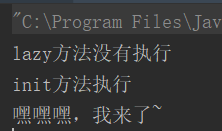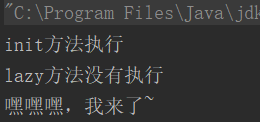1 if表达式
- Scala中if...else..表达式是有返回值的,如果if和else返回值类型不一样,则返回Any类型。
scala> val a3=10
a3: Int = 10
scala> val a4=
| if(a3>20){
| "a3大于a4"
| }else{
| "a4大于a3"
| }
a4: String = a4大于a3
scala> val a5=
| if(a3>20)"a3大于20"
a5: Any = ()
scala> println(a5)
()
2 while表达式
- while循环
scala> def gcdLoop(x:Long,y:Long):Long={
| var a=x
| var b=y
| while(a!=0){
| val temp=a
| a=b%a
| b=temp
| }
| b
| }
gcdLoop: (x: Long, y: Long)Long
scala> gcdLoop(8,9)
res0: Long = 1
scala> gcdLoop(8,4)
res1: Long = 4
- while循环的中断
import scala.util.control.Breaks
object whilexample {
def main(args:Array[String]): Unit ={
var n=1;
val loop=new Breaks
loop.breakable{
while(n<=20){
n+=1;
if(n==19){
loop.break()
}
}
}
println(n)
}
}
结果如下:
3 for表达式
- for中to示例:
scala> for(i <- 1 to 3; j <- 1 to 3){
| print(i * j + " ")
| }
1 2 3 2 4 6 3 6 9
- for中until示例:
scala> for(i <- 1 until 3; j <- 1 until 3) {
| print(i * j + " ")
| }
1 2 2 4
- for中的条件判断示例
scala> for(i <- 1 to 3 if i != 2) {
| print(i+" ")
| }
1 3
scala>
- for中的引入变量
scala> for(i <- 1 to 3; j = 4 - i) {
| print(j+" ")
| }
3 2 1
- 使用yield关键字,将遍历过程处理结果返回一个值。
scala> val for5 = for(i <- 1 to 10) yield i
for5: scala.collection.immutable.IndexedSeq[Int] = Vector(1, 2, 3, 4, 5, 6, 7, 8, 9, 10)
scala> print(for5)
Vector(1, 2, 3, 4, 5, 6, 7, 8, 9, 10)
scala> val for5 = for(i <- 1 to 10)
| print(for5)
<console>:13: error: recursive value for5 needs type
print(for5)
^
- 过滤,通过for中的() 添加过滤器(filter),就是if子句。
object hello{
def main(args:Array[String]){
val filesHere=(new java.io.File(".")).listFiles
for(file<-filesHere if(file.getName.endsWith(".scala")))
println(file)
}}
D:>scala hello.scala
.a.scala
.h.scala
.hello.scala
.s.scala
4 try表达式
- 抛出异常
scala> def ha(n:Int){
| val half=if(n%2==0) print(n/2)
| else
| throw new RuntimeException("n num be even")
| }
ha: (n: Int)Unit
scala> ha(7)
java.lang.RuntimeException: n num be even
at .ha(<console>:14)
... 28 elided
scala> ha(8)
4
- 捕获异常
捕获异常的语法选择catch子句的原因是与模式匹配保持一致。
object ExceptionSyllabus {
def divider(x: Int, y: Int): Float= {
if(y == 0) throw new Exception("0作为了除数")
else x / y
}
def main(args: Array[String]): Unit = {
try {
println(divider(10, 3))
} catch {
case ex: Exception => println("捕获了异常:" + ex)
} finally {}
}
}
D:>scala ExceptionSyllabus.scala
3.0
//当数字改为(10,0)后
D:>scala ExceptionSyllabus.scala
捕获了异常:java.lang.Exception: 0作为了除数
5 匹配表达式
- Scala中的match表达式类似于其它语言的switch语句,它可用提供多个备选项做选择。
object frist{
def main(args:Array[String]){
val firstArg=if(args.length>0)args(0) else ""
firstArg match{
case "salt"=>println("papper")
case "chips"=>println("salsa")
case "eggs"=>println("bacon")
case _=>println("huh?")
}
}
}
D:>scala frist.scala
huh?
D:>scala frist.scala salt
papper
6 lazy懒值
- 当val被声明为lazy时,初始化将被推迟,直到我们首次对此取值,适用于初始化开销较大的场景。 通过lazy关键字的使用与否,来观察执行过程
object Lazy {
def init(): String = {
println("init方法执行")
"嘿嘿嘿,我来了~"
}
def main(args: Array[String]): Unit = {
lazy val msg = init()
println("lazy方法没有执行")
println(msg)
}
}
结果:
object Lazy {
def init(): String = {
println("init方法执行")
"嘿嘿嘿,我来了~"
}
def main(args: Array[String]): Unit = {
val msg = init()
println("lazy方法没有执行")
println(msg)
}
}
结果: 
7 柯里化
在函数编程中,将接受多个参数的函数转化为接受单个参数的函数。这一过程称为柯里化
scala> def mul(x: Int, y: Int) = x * y mul: (x: Int, y: Int)Int scala> println(mul(10, 10)) 100 scala> def mulCurry(x: Int) = (y: Int) => x * y mulCurry: (x: Int)Int => Int scala> println(mulCurry(10)(9)) 90 scala> def mulCurry2(x: Int)(y:Int) = x * y mulCurry2: (x: Int)(y: Int)Int scala> println(mulCurry2(10)(8)) 80
- 柯里化的应用:在忽略大小写的情况下,计较是否相等。
scala> val a = Array("Hello", "World")
a: Array[String] = Array(Hello, World)
scala> val b = Array("hello", "world")
b: Array[String] = Array(hello, world)
scala> println(a.corresponds(b)(_.equalsIgnoreCase(_)))
true